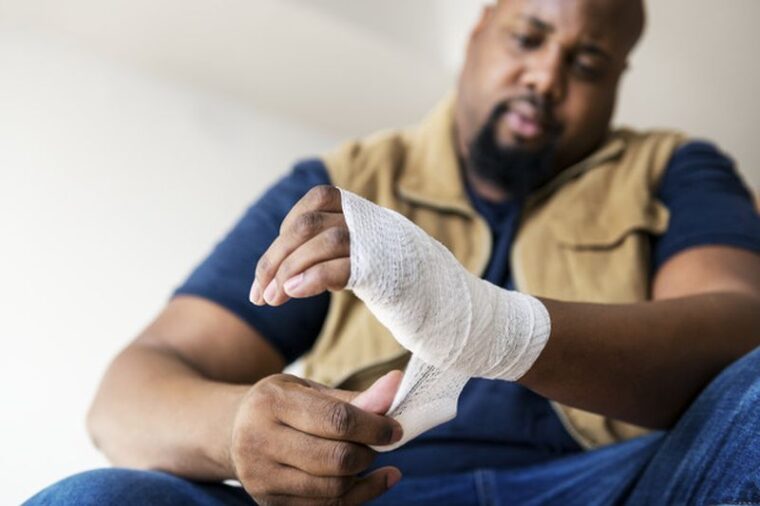Only about 16,397 cases (or 4%) of all personal injury cases are brought to trial because most of the claims are settled out of court. Most personal injury cases involve car accidents, although medical malpractice/errors, bicycle accidents, aggravated assaults, etc. aren’t far behind.
A number of factors affect how much you can get in compensation if you file your personal injury claim, including the severity of the injury, how quickly you sought medical attention after the accident (did you seek immediate medical care?), the presence of pre-existing conditions or injuries that could complicate the claim process, and the validity of the medical care that you received.
If you had earlier injuries and/or if you sought excessive or medically unnecessary care, it could affect how your claim is perceived and what your compensation might be. Regardless of the complexities of your accident, medical history, and the entirety of your claims process, it’s essential that you seek out an experienced personal injury lawyer who can best represent your best interests and answer questions you don’t even know to ask.

What is a Personal Injury Claim?
A personal injury claim involves a person who has been injured in an accident. The claim is the document that seeks financial compensation from the at-fault party (or insurance company) involved in the accident. Some of the most common types of personal injury include:
- Burns
- Birth injuries
- Brain injuries
- Car, truck, or motorcycle accidents
- Dog bites
- Medical malpractice and neglect
- Nursing home abuse and neglect
- Product liability injuries
- Sexual abuse
- Slip-and-fall accidents
- Spinal cord or neck injuries
These personal injury accidents can involve catastrophic incidents that affect you emotionally, physically, and mentally. If you were seriously hurt by the wrongdoing or fault of another person, you have the right to demand compensatory damages to cover the economic and non-economic damages incurred.
What Economic Damages Can You Pursue?
Economic damages are tangible losses, based on lost wages from paystubs, doctor bills, and other documented out-of-pocket expenses. You can also include projected profits and earnings potential, based on current payroll and benefits.
Economic damages include any damage to personal property and goods like your car with any additional belongings in your car at the time of the accident or injury. Still, these calculations are based on documented value. There is also no limit to the economic damages that you can claim in a personal injury case, which is why it’s so important to take every category into consideration.
What Non-Economic Damages Can You Pursue?
Non-Economic damages involve claims of pain and suffering, including the emotional and physical distress and mental suffering from the incident. Since there is no document or record to prove the value of non-economic damages, these calculations are more subjective.

What Factors Are Involved in Deciding Damages & Compensation?
While personal injury obviously affects you in specific ways, it is necessary to associate monetary values with your claim. Your experience is broken down into a calculation of costs, losses, and damages owed.
What is the Average Value of a Settlement in a Personal Injury Case?
With settlements, you can expect to receive less than you would if you went to trial, but at least you’re guaranteed some compensation for your personal injury claim. The average settlement amount for personal injury claims for accidents is ~$65k. While most (96%) claims are settled out of court, some 30% of cases never receive any compensation for their claims.
What Factors Affect Personal Injury Settlement Calculations?
When an insurance company calculates the settlement offer, some limiting factors affect the final amount they may be willing to offer. Here are some of the most common considerations:
- Shared Blame: If the fault or blame for the accident is murky or clearly shared by both parties, the value of the claim may be lower, or it may be declined altogether.
- Policy limits: In some situations, the settlement will not exceed a certain value, regardless of actual damages. In those cases, you’d need to go ahead with a lawsuit to recover damages.
- High Medical Bills: The insurance company may not cover the entirety of medical bills and expenses if they are considered to be excessive.
The goal of many settlements is to make the claim go away at the lowest possible compensation. It often makes sense to settle with the personal injury plaintiff, though, because going to trial could mean a much higher compensatory value.

What About the Time Limits for Personal Injury Claims?
The time limit for personal injury claims can vary depending on the type of claim and the state-mandated restrictions. The statute of limitations can range from one year to six years with some possible exceptions and extensions depending on the type of claim.
The limited timeframe for a statute of limitations encourages injured parties to file the personal injury claim promptly or lose out on the opportunity to file at all. The clock starts as soon as the injury is discovered, in cases of negligence. What that means is that you should not delay in seeking assistance from a lawyer and filing your personal injury claim if you’ve been injured in an accident.
Next Step: Consult with a Personal Injury Attorney
With a 98% win rate, Strong Law Accident & Injury Attorneys has the experience and background you need to achieve the desired result. We’ve been advocating for the rights of personal injury victims since we first founded our law firm, and we continue to put the needs of our clients first and foremost.
When you’ve been in an accident, our team fights to get you the highest compensation in a personal injury claim. We walk you through the entire process and help you understand how and when to present a case that is to your best benefit. We know how important this personal injury claim is to you as you recover from your accident. Make sure to contact a lawyer to explore your legal options. Contact us to learn more about how we can be of aid in your personal injury claim.
